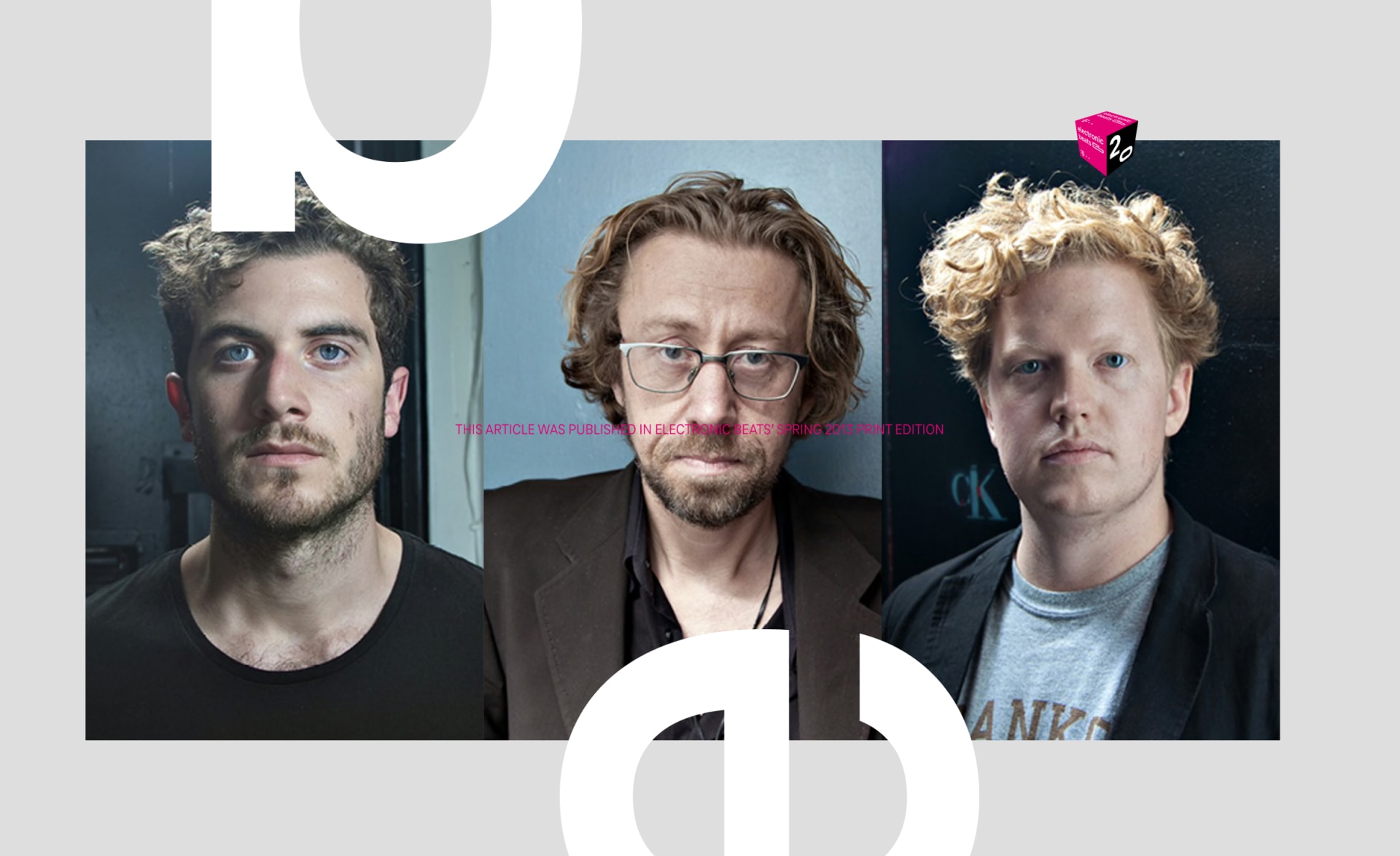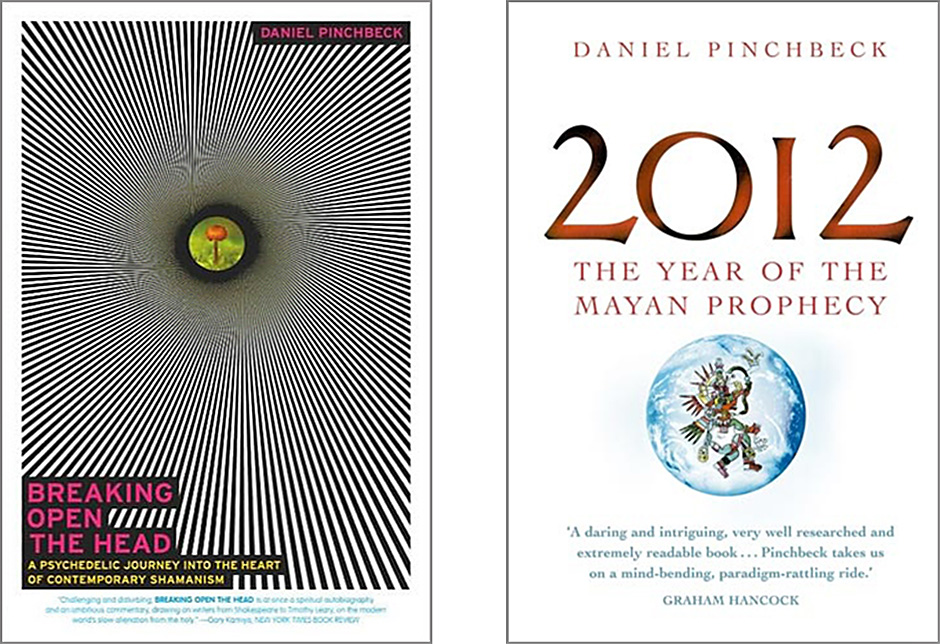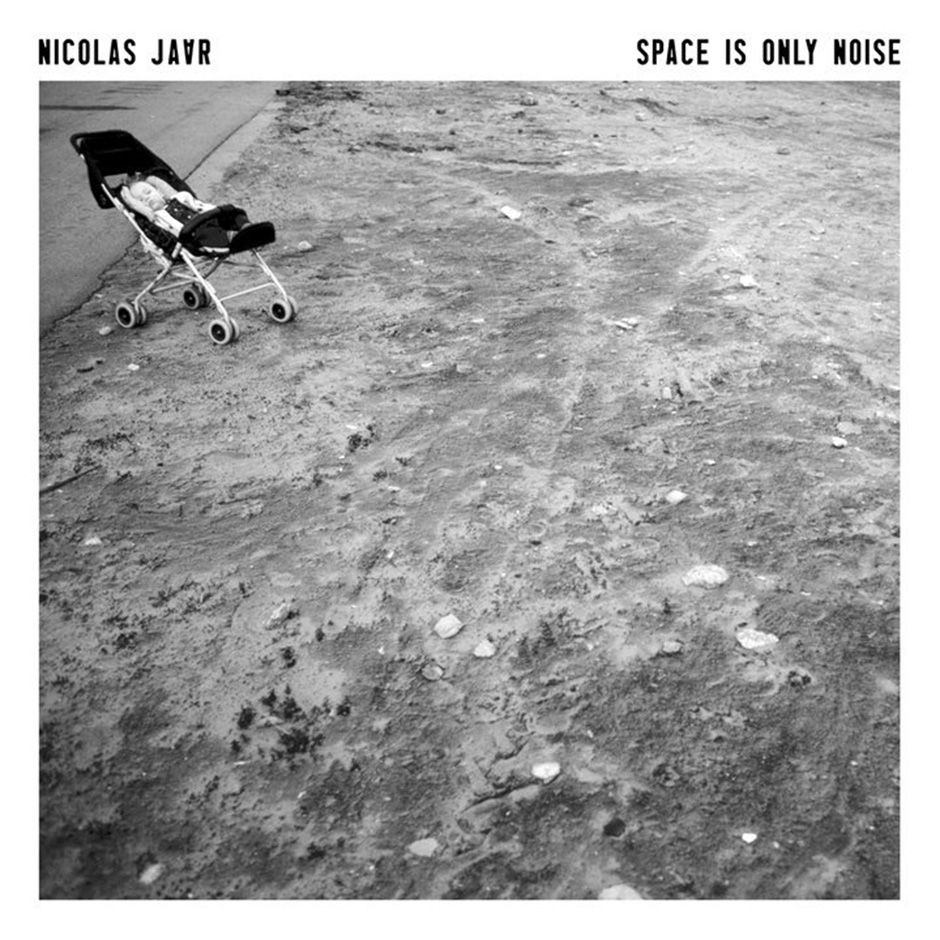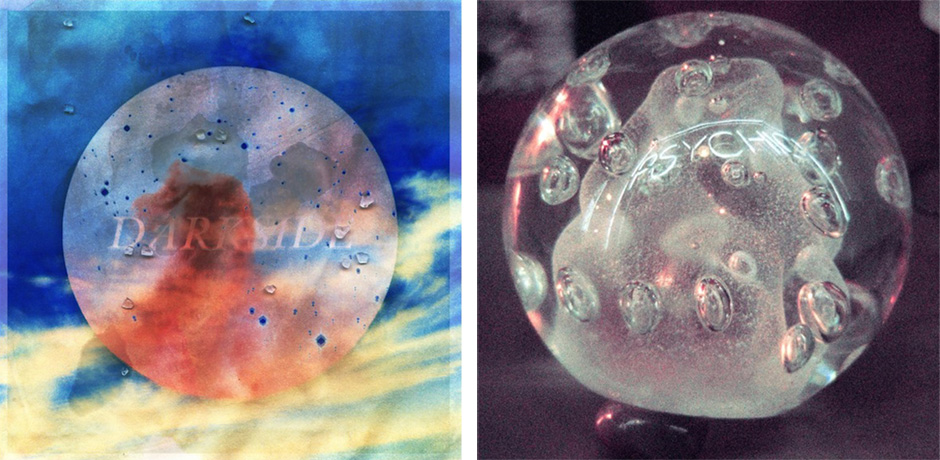

“The physical and the psychic are mirror reflections of each other” – Daniel Pinchbeck Talks to Darkside’s Nicolas Jaar and Dave Harrington
This conversation was originally published in the April 2013 edition of the Electronic Beats print magazine. In celebration of 20 years of EB, we're revisiting major moments in our history—including this conversation on spirit, shamanism, and musical metamorphosis.
Since scrapping his Clown and Sunset label in favor of the newly founded serial imprint Other People, Nicolas Jaar has been branching out to bigger and weirder things—most notably the continuation of Darkside with guitarist Dave Harrington. The duo’s goal of attaining dubby musical transcendence without the use of mind altering substances is ambitious. It’s also a far more sober path to enlightenment than that of NYC-based psychedelic figurehead Daniel Pinchbeck, whose musings on entheogens and shamanism have gained popularity amongst a new generation of illumination-hungry souls. Here, in a curious meeting of the minds, the trio discuss breaking open the head. This conversation was moderated by EB’s former Editor-in-Chief, Max Dax.
Above, left to right: Nicolas Jaar, Daniel Pinchbeck, and Dave Harrington. All photos by Luci Lux.
Nicolas Jaar: Daniel, let me just start out by saying that everybody wants to talk to us about music, which we find boring. And music about music is boring, at least to me. That’s why we’d much rather talk to you, Daniel, about the things we were talking and thinking about when we made our new album, Psychic.
Dave Harrington: The thing I can’t wrap my mind around is why Daniel actually agreed to do this. I mean that sincerely.
Daniel Pinchbeck: Well, I really enjoyed the first Darkside EP and I saw you at this festival Lightning in a Bottle, where I was also giving a lecture. I’m also super interested in electronic music and where it goes and how it’s meandering. I’m always interested in meeting people who are at the cutting edge of music. So I guess my first question would be how and why you contacted me.
DH: Well, there’s actually only one other person who plays on this record other than Nicolas and myself and his name is Samir. We all went to school together and…
DP: Which school?
DH: Brown. He was the first person who brought your name up. We used to sit around and jam and we spent a summer in a kind of warehouse, industrial sweat lodge playing music everyday. And your name came up quite a bit…
NJ: Also I’ve long been obsessed with finding secrets on the Internet. So I’ve read a lot about conspiracies which led me to some of your books…
DH: I’m more of the Breaking Open the Head guy and Nicolas is more the 2012: The Return of Quetzalcoatl guy.
NJ: I think everybody is an alien, I love aliens. I ask everybody if they’re an alien.
DP: Ever met any?
NJ: No. I’ve asked lots of people though. Dave’s seen me do it. I usually just sit down and look the person in the eye and ask them. I sometimes know they’re not going to say no. It’s the weirdest question to ask anyone. So the person says…
DP: That they might be part alien?
NJ: Basically, yeah. People just get so confused and distressed, and I’m like, “Just say no!” But so few people do. And then they have to explain why. And that’s when people start talking about 9/11. But I love secrets that could potentially change everything.
DP: So what’s the world’s biggest secret?
NJ: The biggest? I don’t know. I’m utopian in my secrets. I want the secrets to change everything for the better.
DP: William Blake talked about how human imagination is not just a mental state, but rather it’s existence itself. So maybe that’s the secret we’re just tickling the edges of.
NJ: I would love for people to find out that aliens exist and that they live here on earth; that there are huge clans of intergalactic space wars. I would love for us to just get our ego killed, demolished by a larger power, a larger story.
DP: Why?
NJ: Because the human ego is so boring. It’s like you think this tiny earth is anything? I would love there to be this larger scheme of things.
DP: I consider it highly probable that there’s a vast cosmological narrative. But it doesn’t mean we’re nothing or not as important as anything else.
NJ: Well, I like the idea of us not being as important as many other things that are happening. It’s not just about humans. There are plants also, by the way. There’s water out there. I’d like the conversation to revolve around what other people and things “think”.
DP: So psychedelics and shamanism play a role in how you work and how you think about music?
DH: It’s not part of our practice…
NJ: I’ve never done drugs in my life.
DP: Oh, wow.
DH: But I started reading Timothy Leary and Aldous Huxley when I was sixteen. I went to see the Allman Brothers a whole bunch when I was in high school. And those experiences left indelible marks. But I think Nicolas’ and my ideas are similar even if our experiences aren’t shared in that respect. We’re not a shamanistic band in the sense that we have gone to the desert together. But I’ve been cheating, preparing for this conversation and going back and reading your book. But getting back to why you’re here talking to us right now. I thought about you, us, greater narratives, music and one of the stories from Breaking Open the Head about your experience taking mushrooms in Mexico with a shaman.
DP: That was in Oaxaca where in the town of Huautla de Jiminéz, where in the fifties Gordon Wasson took part as the first known westerner in a psilocybin mushroom ceremony.

Above left: In Breaking Open the Head, Daniel Pinchbeck’s first work of creative non-fiction, the author describes how hallucinogens were key to his personal spiritual awakening. Unlike heroin and cocaine, which were widely used amongst his peers in downtown NYC’s artistic and literary circles, Pinchbeck experimented with psychedelic substances not because it felt good or enhanced his social life. Rather, LSD and, in particular, psilocybin mushrooms sparked him to seek new worlds both philosophical and geographical, eventually leading to his participation in various shamanistic rituals involving hallucinogenics worldwide. And so began his shift from secular materialist to ardent believer in spirits worlds.
Above right: In his third book, 2012: The Year of the Mayan Prophecy, Pinchbeck explores the consequences of his “anti-materialist” world view, tracing his conversion from thinking about society as driven by industry and capital to accepting the larger role of intuitive and magical domains so often negated by the system. This is the point of departure for an analysis of Hopi and Mayan calendar prophecies and their apocalyptic predictions in regards to various phenomena, including aliens, crop circles, quantum theory and 9/11. To help him connect the dots, Pinchbeck draws on knowledge gained from extremely powerful psychoactive substances such as the African psychedelic ibogaine or the South American brew ayahuasca.
DH: That was kind of like the point zero of psilocybin into the West, right? Maybe I’m drawing a tenuous connection here but I was thinking about the shaman’s role in guiding you through your experience and I believe that the space of intense, loud, live music, can potentially reflect that ritualistic, shamanistic moment.
DP: I think that’s true to a certain extent.
DH: We as performers and musicians sometimes feel the sound is in this soup mixing all together, you know? It’s kind of shooting the moon to say that we’re being shamans. But the idea reminds me a bit of The Grateful Dead.
DP: I’ve heard that quite a bit in the Burning Man, West Coast scene—that the DJ is kind of an electronic shaman, shaping the container on the journey.
DH: It’s not a revolutionary idea, I know. I’d just never thought about it too much before our meeting.
NJ: Here’s the thing: Daniel, you’re talking about a DJ being a shaman and then there’s this other thing with The Grateful Dead, Phish, and the Allman Brothers just jamming, right? But there’s a middle point. Where? Between using the sounds that a DJ could use and that kind of storytelling, but doing it within the jam context with instrumental elements. I think David and I are excited about the idea of shamanism in general. But the idea is not that we’re the shamans, rather that maybe the music can guide us, you know? Maybe we’ve gotten to the point now where you can be guided by the best things about electronic music and DJ culture and then by the Grateful Dead and jamming culture and bands of the sixties and seventies. Maybe that can lead you out of the black box of the show, right? Now where does that take you? Maybe for a second you get outside of your life. But that’s pretty boring—I can get that from a pretty bad movie on an airplane. But maybe, just maybe, it can take you a little further than that. And we’ve gone quickly to one of the biggest questions: How much can we be guided?
DP: I’m struck by the idea that music can guide you. What do you mean by that?
NJ: I know for a fact that all I can be and do is get better at my job. But not get better at making “good” music. Being good at my job means going and cleaning my instruments everyday and making sure that razor is sharp. Getting my knobs right. It’s like something artisanal. Everything else will happen at the right time. I am absolutely nothing as a “container” for spiritual content. What I give to people is something that I will hopefully receive from some other place. When I see artists and musicians who say they completely “own” their work I think that maybe it’s true for them but not for me. We are channeling. We are mediums. There’s no ego, that’s not the point. Use your ego to get good at your instrument. Technically talented musicians are wielding a hammer, but that’s nothing.
DH: We often don’t talk about music. We just make it. And when we do talk about music, it’s more an investigation. People say that Miles Davis’s greatest strength was as a bandleader, not a musician. He decides he wants to play with certain people and then he just trusts them. It’s really like Miles is the DJ. His music is a great gesture of egolessness, especially because jazz was often so much about individual voices and the soloist and technique and how far you can excel in these parameters. He kind of undoes all of that. The result is that it makes a new branch in the musical tree.
NJ: Do you have experience with channeling, Daniel?
DP: Oh definitely. I think all art making is channeling if it has any integrity to it. I’ve written about it before but I have had drastic experiences of a voice speaking through me during an ayahuasca ceremony that continued for over a week. The book where I describe it was actually rejected by my original publisher, because they just couldn’t fathom it.
NJ: How do you cope with that? Is there a certain amount of self-doubt when that happens? That is, that it’s actually happening?
DP: I think self-doubt is a good thing. In the book I talk about gods and spirits and people like Aleister Crowley. And then it turned out to be kind of a hoax or a fraud or something. So I think you kind of need to check back in. I believe in spirits and one day we will have a scientific explanation for them, maybe through quantum phenomena. I think we will come into contact with other dimensional beings that can speak through us. Shamans are people who make alliances with different spirits, and I’ve seen a lot of ceremonies with ayahuasca for instance where you can see the shaman incorporating a specific spirit they’ve been working with.
NJ: When I hear about stuff like this there is very little doubt that these kind of things should or would exist. I understand it. But why is it not being used more? Why is it not more prominent? Why does Western society reject it?
DP: Because Western society has long been possessed with a materialist worldview. We’ve totally rejected the possibility of other psychic experiences or consciousness and narrowed ourselves down to only valuing what could be quantified materially. In a way you could even see philosopher and visionary Rudolf Steiner saying that materialism is a kind of spirit that enters into us, one we try to reverse. He gives the spirit the name “Ahriman”, which he sees as a necessary force that we have to deal with to develop technologies.
NJ: But where does that spirit come from?
DP: Well, there are different ways to language it—whether it’s Carl Jung talking about archetypes that are in the collective unconscious or Steiner describing different planes and dimensions to different worlds. It’s interesting because when people have these experiences and recognize the validity of them, they need to construct a language or understanding that’s not a rigid belief system because the experiences vary. Why should we know everything? We’re still developing our understanding of these other worlds.
NJ: It’s a very immature thing to want, but I like the idea of there being an origin to the evil of our society. I like the idea of saying, “There is a demon! It is this specific spirit!” I like the idea because the truth is actually there are all these different problems. But if there were one root, we could say it all had to do with one clan. We can talk about that clan. Where do they come from? Why are they doing this? Do you know what I mean?
DP: You have people like David Icke who talk about negative reptilian aliens that have tried to create a human slave race. Personally, I find that too literal. But whatever the case is with ecological problems or vast disparities in equality, we have to decondition ourselves as human beings from compulsive, destructive behavior.

Above: Nicolas Jaar’s first LP Space Is Only Noise (Circus Company) immediately made waves when it was released back in 2011. The blogosphere was braced for an impressive entry due in no small part to a series of impressive singles and EPs that preceded it. At the time, the Chilean-born, NYC-raised upstart was still pursuing his Bachelor’s degree in comparative literature at Brown University in Rhode Island. It’s there that he would meet Dave Harrington and begin the musical dialogue that developed into Darkside. While Jaar’s sound has evolved, he has also retained a love for slower grooves which drive below the dancefloor speed limit. Many consider that liminal rhythmic space difficult to inhabit. For Jaar, it’s a comfort zone.
NJ: So you had a voice talking to you for a week. I’m interested in the sound. What was the texture?
DP: I’ve had all sorts of sound experiences with psychedelics, especially related to electronic music. But in this case, the voice was like a more emphatic version of my own voice. It was me but to a much higher degree of gravity and seriousness and conviction.
NJ: Did you recognize the words? Was it in a language you understand?
DP: It was in English. I had it also with ibogaine, this African psychedelic. It was almost like a journalistic interview with the voice. I asked this spirit questions and the answers were shouted back in my head.
NJ: And in the most simple sense it was like a heightened version of you?
DP: It sort of introduced himself as God.
NJ: Morgan Freeman in your head?
DP: Something like that. My friend who took ibogaine in order to try and kick heroin once asked the spirit: “How can I serve humanity?” And it shouted back at him, “Clean up your room!” And it was helpful, because his room was pretty dirty.
NJ: What’s the most surprising thing this other-you-God said? Or any of these channeled voices? I like talking about this because I think maybe we can get to something musical.
DP: Something I have written about in the past is how near humanity is to some kind of metamorphosis or transmutation event. Is it something we’ll experience in my lifetime or in your lifetime? Is it a one-hundred-fifty-year process? Is it a never-ending process? Are technology and biology going to merge? Are we going to pursue technologies that accentuate and elevate our psychic abilities? If the latter was true, I think it would go along with some kind of awakening, and we would have accelerated progress on earth. That’s part of the message I’m trying to transmit. I still feel it’s beyond most people’s ability to know what the heck I’m talking about but I remain optimistic that we’re on the cusp of a deeper level of metamorphosis. The fact that we’ve got ourselves into this ecological mega-crisis has spurred us to go into an initiation, an awakening. We’re just seeing the beginning of it with events like Hurricane Sandy.
NJ: So this is the information that got channeled through you?
DP: Yeah, the voice explained that now is the long foretold time of the apocalypse, a time of unveiling and uncovering. It explained that there would be a vast transformation and collapse of the global financial system. It also said that those people who are awakening to the deeper dimensions of the psyche would somehow be carried through this process—that it wouldn’t be as destructive to them. Part of what we would be learning is that the physical and the psychic are mirror reflections of each other. I still stand by that idea. It seems to be happening in the lives of a lot of people that I know. Too many people don’t see that there is a direct relation to our spiritual development and what manifests in the physical reality.
NJ: So what’s happened since 2012?
DP: The book or the date?
NJ: The date.
DP: Well, nothing so drastic, I guess. But that’s also what I had written. I would say on a subtle level, people’s ability to manifest is accelerating and their thoughts are more capable of impacting the world around them, in both negative and positive ways. I guess it depends if you’re a sleeping person or somebody who’s awakening to our co-creative capacities. If you’re awakening then you have to take more responsibility because your negative thoughts can cause more negative impact. I’ve hosted two retreats in the mountains in Columbia together with the Kogi and Arawak tribes who claim that they are “older” civilizations. They walked twenty-five hours to the mountains to talk to us about it.
DH: You mention the connection between technology and biology. Do you think that’s related to what you’re discussing? Is it the material manifestation of it?
DP: I don’t think it’s ultimately “material”. I think technology is the manifestation and projection of consciousness. We have an idea and then we manifest it as a tool. The tool then reflects back on us, and then we make another tool because we keep iterating. Consciousness keeps creating versions of itself. Mastering technology is something we need to do; that is, not letting it control us or let it get out of our control. We need to master the projections that we’re unleashing. Then we can look at people like Buckminster Fuller and his whole design and science philosophy and marvel at his ability to use technology to create a fully sustainable or abundant planetary civilization.
DH: It’s interesting to me because what you’re saying truly is built into technology. I went to a master class once with a jazz drummer who was very serious when he said, “If you can’t make music with two sticks and a rock, then you can’t make music at all.” And there’s some truth to that. But we work in an era where we go to the complete opposite of the spectrum where technology becomes part of the means of expression. When I heard you talk about the dichotomy between technology and biology I thought about the experiences I’ve had, specifically being electrocuted on a low level for an extended amount of time without my knowledge. Since then I’ve been extremely sensitive to electricity. But we couldn’t do what we do without risking being electrocuted, in some sense. I’ve never had that shamanistic desert or jungle experience, so when I think about the times when I was most exposed to something out of the ordinary in terms of perception, it was always in the context of a hyper-modernized environment reliant on structures and material and technology. Do you think that stuff is just illusory?
DP: Not at all. I use technological tools all the time, so does my daughter.
DH: The question for me is what happens in the jungle and desert that can’t happen right here in New York City.
DP: I’ve been involved in all sorts of local scenarios, but the thing about ayahuasca is that it’s different when you do it in the jungle and are surrounded by the plant itself, as well as all other plant life, you know? It’s as if the plants are speaking or even singing to you. I feel almost spoiled to have had that experience, it’s so incredibly beautiful. But you’ve mentioned storytelling on your records before. How do you include narrative in what you do?
DH: I would say that we’re less interested in a linear narrative and more in a larger journey. The feeling should be that you go on a spectral trip from the first sound to the last sound. You enter a space, you explore it, you walk around, and then you enter a new space.

Above left: Somewhat bluesier than Jaar’s solo work, Darkside’s self-titled EP, also released in 2011, drew comparisons to everything from Manuel Göttsching and Balearic house to “lobby-jazz”.
Above right: Following their curious remixes of Daft Punk’s Random Access Memories earlier this year (as Daftside), Psychic sees Jaar and Harrington traversing mildly psychedelic terrain. The result of their artistic strategies of channeling each other’s voices and telepathic communication through improvisation is a halcyon vision of what dance music could be: calmer, equal parts electric and electronic, and never mistaking stasis for hypnosis. It is nothing if not bold.
DP: How do you define that new space?
DH: It’s hard to be specific about that.
NJ: We turn a song into a landscape. I still fight with the idea of how to communicate in four or five minutes and make it entertaining. It’s much deeper than worrying about what’s “formulaic”—rather it’s about it sounding like music. How do you make something that’s entertaining and pleasurable and that you can play that also doesn’t somehow scream, “This is a song!” It’s easy when you think about people like Philip Glass and Brian Eno, or minimal music in general. It’s music, sure, but it’s more like math that you can hear. And that’s cool, you know? But there’s a certain amount of not wanting to be the “younger brother”, musically speaking. The younger brother writes formulaic songs and knows what works and how to get paid for it. Good job, younger brother. But the older brother is interested in ascension. He wants to tell this story of connection, communication, and love through time—not through any structure that has anything to do with previous forms. That’s the hardest thing today: not trying to deliberately go against formula because that’s formula too. I’m talking about ascensions here.
DP: Uh, what do you mean?
NJ: Look, you listen to a song on the radio, and it has a formula. You listen to a noise band that avoids that and does the opposite? It’s the same thing. I don’t give more props to the noise people that say there’s no formula because it’s just working in contradiction to formula. Ascension for me has nothing to do with formula or no formula. It’s just… ascension.
DP: OK, but I don’t know what you mean by that.
NJ: It’s the idea of something that’s above formula and non-formula. It’s a complicated question because it’s about what we need to get to.
DP: I think “ascension” is such a Christian concept. Even the dualism of spiritual and material is something that most indigenous cultures would reject. For them it’s meshed together in a deeper way.
NJ: Forget the word ascension.
DP: OK. My father was also an artist, and I’m curious to know how your father has influenced your work.
NJ: He’s a visual artist, but beyond that he’s a social and political artist. His work is based in the idea that art is inherently political. When I was young and before I made music I wanted to be an artist just like my father because that’s all I knew. Then I realized during certain moments listening to music that it’s hitting me before I think about it politically or socially or any single way. I move, dance, like it, hate it, and the frequencies either resonate inside me or they don’t. First it’s primitive and intuitive. My dad being an artist put me in a position to think about if I wanted my content—the content of my art—to deal with the real world or what happens a second before it. But the older I get, the more difficult I find it to leave the real world. Before in my life, music just hit me. Now I think about how good the snare sounds or how good the chord is.
DP: What about the social or political concerns that your father addresses?
NJ: I don’t think I’m there yet in my own thinking. I don’t think I’m mature enough to talk about the things my father talks about in his art. I’m much more interested in spirituality.
DP: Do you have any kind of spiritual practice? I know you said no drugs, but maybe meditation?
NJ: No, just music. But at it’s best it’s one-hundred-percent spiritual. It’s by far the most transcendental and incredible feeling I’ve ever had. And it’s beyond any words I can find to describe it. I got it improvising early on with my friends. And that’s when they started doing a lot of drugs and stuff. I thought as long as I’m jamming three days a week, I don’t need that. Playing the piano really does it for me. And that’s related to the idea of the medium and why we called this new album Psychic. I felt like in order to make this music with Dave a collaboration, I had to become his medium. He had to talk through me, and I had to do the same thing. Also I feel like psychic shops in America symbolize so many things about today’s culture. The first is that your future is turned into a commodity. But deeper than that, all of these shops are the psychics actual homes. They live there. This is their front room. When they close the drapes they have dinner there, amidst these crystal balls and stuff. The idea that even this sacred kind of spirituality has been co-opted and beaten down by capitalism in today’s world was something that added layers to the music we made. Because what we do is very American music.
DP: I see a distinction between the spiritual and the psychic. The spiritual has positive ideas of elevation whereas the psychic is more ambivalent. The most obvious manifestations of the psychic are these tragic storefronts that look so much like kitsch and bologna. It’s the perfect signifier. I mean you can find people who do have psychic gifts and can get something out of them, but they don’t work in these shops usually.
DH: I think it all depends on how cynical you are. I’ve never gone to a psychic and said, “Hey, here’s five dollars. Tell me my future.” It’s still too real. The idea is that something will be said and there will be some dynamic action, even if it was complete bullshit.
DP: It’s like in quantum physics.
NJ: Or improvisation. ~
This text first appeared first in Electronic Beats Magazine N° 36 (4, 2013).
The 20 year Electronic Beats book is out on March 15th. You can pre-order a copy via Do you read me ?!
Published February 17, 2021. Words by Max Dax.












Follow @electronicbeats